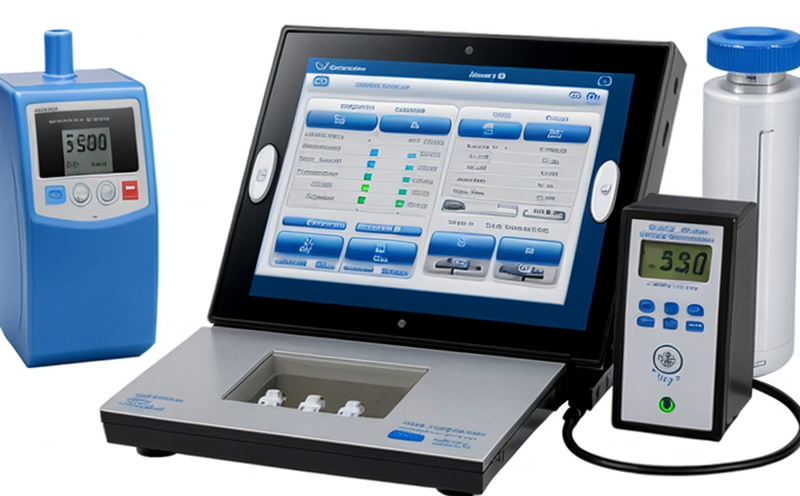ISO 8537 Sterile Single-Use Syringe Infusion Device Testing
The ISO 8537 standard is a critical component of ensuring the safety and sterility of single-use syringe infusion devices used in medical applications. This service focuses on the rigorous testing required by this international standard to ensure that these devices meet stringent quality and reliability criteria, particularly in environments where patient safety and infection control are paramount.
The test procedure outlined in ISO 8537 involves multiple steps aimed at verifying both the mechanical integrity and sterility of single-use syringes. A key aspect is the testing for leaks under various pressure conditions to ensure that the device can withstand normal operating pressures without compromising its structural integrity. Another critical step is the microbial challenge test, which assesses whether the device remains sterile after being exposed to a known bacterial or fungal contaminant.
Testing these devices also involves ensuring compatibility with a variety of drugs and solutions typically used in infusion therapy. This includes evaluating how well the syringe can deliver precise dosages under different flow rates and pressures, which is crucial for accurate drug delivery systems.
The testing process begins with proper specimen preparation, including cleaning and sterilizing the devices according to ISO standards. Once prepared, the samples are subjected to a series of mechanical stress tests designed to simulate real-world conditions during use. These tests include pressure cycling, vibration testing, and durability under various operating conditions.
For the microbial challenge test, the syringes undergo exposure to a standardized bacterial or fungal inoculum. After incubation, any remaining contaminants are analyzed using microbiological techniques to ensure the device maintains its sterile state post-exposure.
The results of these tests are meticulously documented and reported according to ISO 8537 requirements. This documentation includes detailed test protocols, specimen preparation methods, and comprehensive analysis of all testing parameters. The final report provides a clear assessment of compliance with the standard, highlighting any areas where additional improvements may be necessary.
This service is particularly valuable for medical device manufacturers seeking to ensure their products meet international quality standards. By adhering strictly to ISO 8537, healthcare providers can have confidence that these devices are safe and reliable, contributing to patient safety and reducing the risk of contamination or malfunction.
| Testing Parameter | Description |
|---|---|
| Pressure Cycling | Simulates real-world operating pressures to ensure structural integrity. |
| Vibration Testing | Evaluates the device's ability to withstand environmental stress without failure. |
| Durability Under Operating Conditions | Assesses long-term performance and reliability under expected use conditions. |
| Bacterial/Fungal Inoculum Exposure | Tests for sterility after exposure to known contaminants. |
Applied Standards
The ISO 8537 standard is a crucial document in the medical device industry, particularly for single-use syringe infusion devices. This section outlines the key standards and guidelines that are applied during the testing process.
| Standard | Description |
|---|---|
| ISO 8537-1:2019 | General requirements for sterile single-use syringe infusion devices intended to be used with non-pyrogenic solutions. |
| ISO 8537-2:2019 | Specific requirements and test methods for sterile single-use syringe infusion devices intended to be used with pyrogenic solutions. |
| ISO 11135:2014 | Biological evaluation of medical devices—Sterility testing and microbiological techniques. |
| ISO 8687:2019 | Single-use syringe infusion devices intended to be used with non-pyrogenic solutions—Compatibility with drugs, biological substances, or other solutions. |
The application of these standards ensures that the testing process is comprehensive and aligns with global best practices. By adhering strictly to ISO 8537-1 and -2, as well as supplementary guidelines like ISO 11135 and ISO 8687, we provide a robust framework for assessing the quality and reliability of single-use syringe infusion devices.
This service is designed to meet the stringent requirements set forth by these international standards. Our expertise in medical device testing ensures that every aspect of the testing process adheres to these guidelines, providing peace of mind for manufacturers and healthcare providers alike.
Quality and Reliability Assurance
- Comprehensive Test Protocols: Our team follows detailed protocols outlined in ISO 8537 to ensure thorough testing.
- Microbiological Techniques: Advanced microbiological methods are used for sterility testing and microbial challenge tests.
- Data Analysis: Statistical analysis of test results ensures accurate interpretation and reporting.
- Certification Compliance: All reports meet the rigorous standards required by international regulations.
The quality assurance measures implemented during ISO 8537 testing are designed to ensure that every syringe infusion device meets the highest levels of sterility, safety, and reliability. By leveraging these stringent protocols, we can provide manufacturers with detailed insights into the performance and compliance status of their products.
Environmental and Sustainability Contributions
The ISO 8537 testing process not only ensures the safety and sterility of single-use syringe infusion devices but also contributes to environmental sustainability. By adhering to strict quality and reliability standards, we minimize waste and ensure that these devices are used efficiently in healthcare settings.
Our testing protocols help manufacturers identify any design flaws or performance issues early in the development process. This proactive approach reduces the need for rework and subsequent waste, contributing positively to environmental sustainability efforts. Additionally, by ensuring that only compliant products reach the market, we help reduce the risk of product recalls and associated environmental impacts.
The use of advanced testing methods also allows for more precise manufacturing processes, which can lead to energy savings and reduced resource consumption during production. By focusing on quality and reliability from the outset, we support a more sustainable healthcare industry ecosystem.





